|
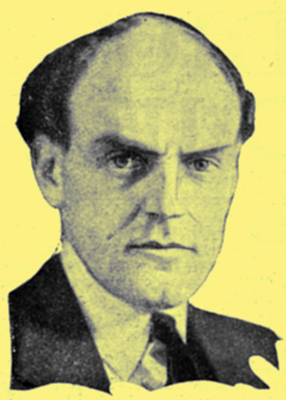
A recent studio portrait of the author.
The great responsibility of his position does not affect Sir John Reith's facile pen nor spoil his inherent sense of humour, as is shown by this wise and very readable article which is about the lighter side of his life as the executive head of the BBC.
'Your article for Modern Wireless' said the voice, 'is due on Monday morning'.
'Oh, is it?', said I, aggrieved - this being Friday night. 'And what am I to write about this time?'
For this voice had not only decreed that I should write a periodic article; but was in the habit of prescribing the subject thereof. Sponsored Pro-grammes; Centralisation; Alternative Programmes; all these were important matters and had been dealt with.
'What about a nice article on Finance?' I asked. 'How many listeners realise that only 5s. - only only 5s.-'.
'No,' said the Voice, and I knew from the tone that it would be hopeless to argue. 'We want something personal this time.'
Something what?' I gasped.'
'Personal,' it repeated, 'definitely personal. Your point of view, for instance. That would meet the case admirably.'
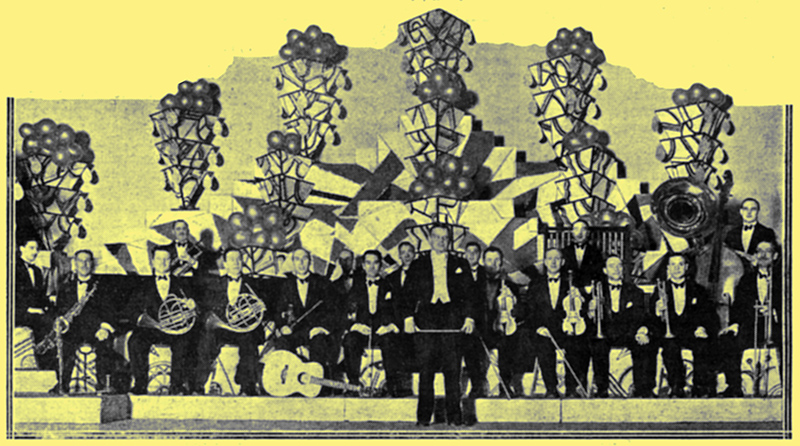
Well-known music makers of the microphone - F Kitchen and his Brixton Astoria Band.
Obviously Nonsense!
'I can well believe it,' I ventured.
'Yes, your point of view, you know. About things in general and the - er - programmes in particular.'
' What?' I interjected. 'The programmes - Oh, yes! Ha!'
'The programmes - what you like to hear in them; and the Post Office and the Press, and your philosophy of life, and so on. An excellent article, on pPersonal lines.'
'Yes,' I, said. 'You can imagine my writing that sort of stuff, cant you?'
'It would be to the advantage of the Corporation,' the Voice replied. 'Thank you very much.'
And left it at that, too. Sounded almost like a threat, didnt it? I dislike having cryptic things of this sort fired off at me, especially when I am not given the opportunity of dealing with them. 'Come back,' one wants to cry. 'Stand still and explain exactly what you mean by that.'
If it were to be taken literally it would seem to suggest that ones personal views and opinions, even on matters not directly connected with broadcasting, were of interest to other people - your readers, Mr Editor, among them. More than that - that Whatever those views and opinions might be, the BBC in some mysterious way would benefit by the mere expressing of them.
Now, with that I would disagree totally and emphatically. It is obviously nonsense. 'On the contrary, I believe that the less that is known about BBC personalities the better. Perhaps that might be more happily worded, but we can leave it as it is, and so provide the usual facilities or misinterpretation and disregard of context. (Hitherto one has provided these facilities gratis, but I think a business arrangement ought to be made in future.)
The Anonymous Staff
What I was saying was that the less that is known of BBC staff the better. (Any excuse that the remark was inadvertent can now be rejected, as it is deliberately repeated.) I certainly do not mean that they, more than others or even as much, have things to hide - bias and prejudice and such like on the one hand, nor poverty of intellect, imagination and experience on the other.
I suppose it is natural that there should be an interest in the personalities at Savoy Hill. It varies in nature and in degree. The curiosity may be friendly, or malicious, or just idle.
The more you know about them the more facets are presented for criticism and attack, particularly that ill-conditioned variety which seems to draw its sorry inspiration from personal animus, heaven knows how or why originating.
People are too prone to interpret the crimes of omission and commission in a departments activity in terms of the known personal characteristics of the head of it. I do not suggest that they would always be wrong in so doing. But they would at least as likely be wrong as right.
Wise Principle
The principle of comparative anonymity is, I am sure; wise. It was adopted in the earliest days, It does not imply that there should never be any public; reference or credit for individuals, but that this should be exceptional.
Apart from anything else, it is difficult to keep things in their right proportion. If one name is mentioned, it may be unfair to omit others. So where is the line to be drawn? An individual effort of particular merit justifies personal mention, but on the whole it is better for the work to be done impersonally.
I have often been amused by peoples conception of the size and procedure of the BBC. I think all the staff come across it in one way or another. Not long ago I was introduced to two elderly ladies. 'Of the BBC, you know', said the introducer. The ladies were obviously immensely interested. They were even thrilled. But it was clear that they were mystified as well. They were apparently regular listeners, but the name was new to them.
There was nothing unusual in that, and I was not surprised, but I could see that they were determined to 'get a line on me', as the Americans say. No, it was not I who said 'London calling'. Never? Well, hardly ever - once or twice a year, perhaps.
How disappointing. Was it I who 'chose the programmes - decided what was to be broadcast? What a task? No. I could not say that I did that, either. Much supplementary questioning before they asked directly What my job was. Did I have a title of any kind? Yes, I was sometimes referred to as Director-General. This was really quite exciting. In fact, it almost made up for the disappointment of my not being an announcer. The mystery had been solved. 'I suppose', said one, 'you sit in a little office off the studio'. I supposed I did.
But even in the case of those whose ideas of the organisation are not quite so rudimentary, it is extraordinarily disconcerting to be confronted with the question, 'What do you do all day?' Well, the day is long, and it seems very busy. How much effective work has gone into it? How much has been unproductive? Who can tell.
A Dreadful Tyrant!
Sitting at home as I write these notes, I think how much less time has been spent here than in my room at Savoy Hill - the room I chose for myself in December, 1922, and which I have occupied ever since. It is a pleasant room. It commands one of the finest prospects in London.
When the time comes I am sure I shall leave it with regret. It has witnessed many interesting, and important events; in some ways; it seems even to have been party to them, for atmosphere helps. But it has been a dreadful tyrant. It exercises a tyranny Within Savoy Hill.
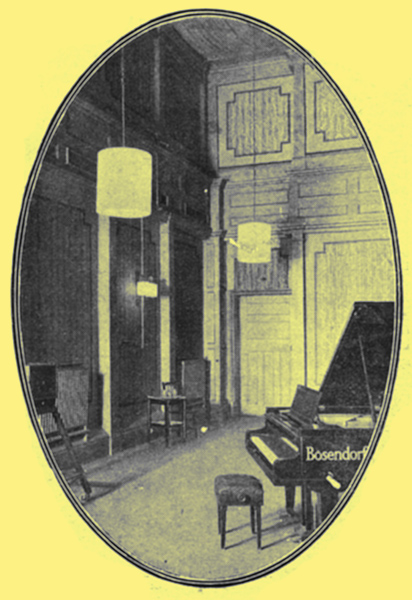
The Number Seven studio at Savoy Hill.
On many occasions when I set out to visit other people, or to listen to the rehearsal of some clever play or revue or vaudeville, it summons me back to business. As if a jolly hour in a studio; were not as much my business as contracts and meetings and telephone conversations!.
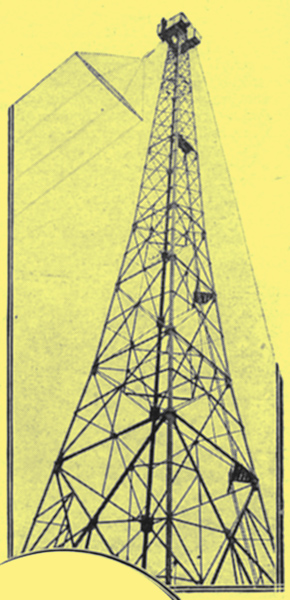
One of the Brookmans Park Masts.
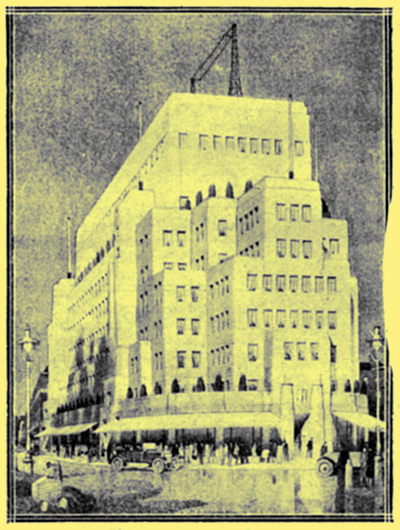
The picture above shows what Broadcasting House, London, will look like when completed.
|